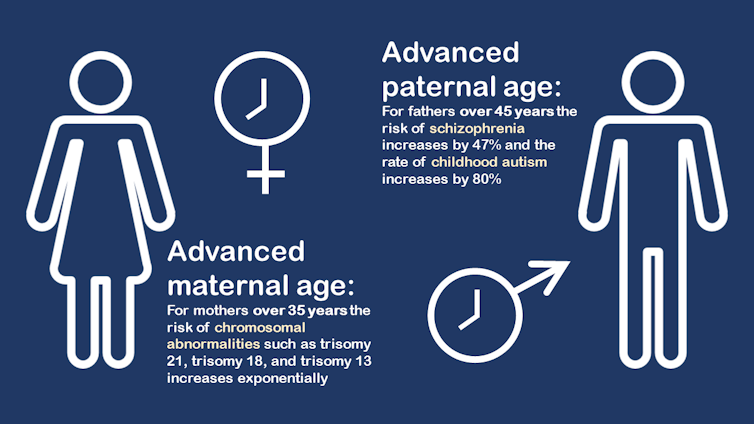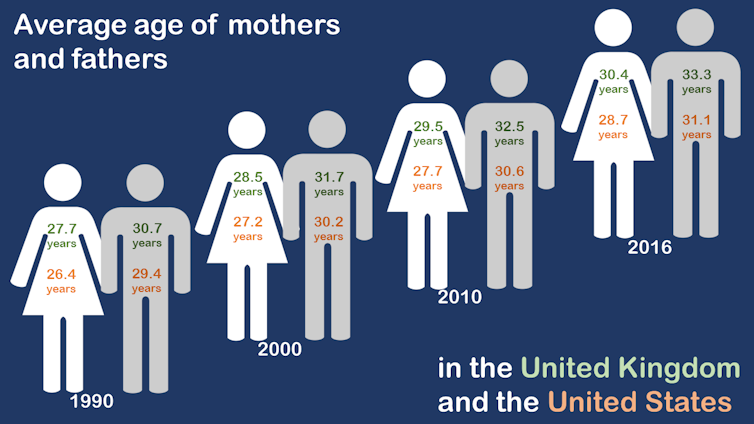What Is the Perfect Age to Have a Baby
Over the by 3 decades, there has been a steady increase in the average historic period of parents. Advances in fertility science mean that people can, literally, put their eggs or sperm on water ice and delay the start of parenthood. Many large companies, such as Apple, Facebook and Google, now offer egg freezing to employees as part of their healthcare package. Putting off having a baby has never been easier or more socially acceptable. But is information technology a good matter?
There are three things to consider. Will your child be healthy? Volition you get significant? How much will it cost?
Parents accept a moral obligation to requite their child the best start in life. Only children born to mothers over the age of 35 and fathers over the age of 45 are at greater chance of having genetic and neurodevelopmental disorders, such as schizophrenia and autism, which arguably affects the child's quality of life.

As well, older parents are more likely to need assisted reproduction, such every bit IVF, which is associated with babies being born early or with depression birth weight. Babies born via IVF are also at college risk of cardiovascular and metabolic disease in later life.
If prospective parents freeze their eggs or sperm when they are younger, they can reduce some age-associated risks simply not those due to IVF. The method of fertilisation in IVF with frozen eggs is intracytoplasmic sperm injection (ICSI), where sperm is injected into the egg. ICSI can also increase the take chances of birth defects in children. Using ICSI is likewise more common in older men where sperm motility is poor. Once again, not the best kickoff in life.
Baca juga: Tick-tock – for salubrious mums and kids, dad'due south age counts
And so y'all've decided to wait
If you want to wait to accept children, you are not alone.

Most couples will fall pregnant after trying for a twelvemonth. Although one in seven couples has trouble conceiving – and age is a big player in this. One in half dozen women anile between 35 and 39 years of age will not conceive after one year. If their partner is over 40, this drops to more than one in four.
IVF is seen by many as a fail-safe way of conceiving, merely its success is also governed by age. For a woman using her ain eggs, the success of IVF over 40 is less than 10%.
The risks of delaying parenthood have been faux with computer modelling. If a 30-year-erstwhile woman delays trying for a baby from age 30 until 35, her chances of falling pregnant are reduced by nine%, but IVF will simply compensate for four%.
And if you desire to freeze eggs, great. Except women produce fewer eggs ("oocytes") every bit they get older, so older women may need more rounds of stimulation to shop the eight to ten eggs needed for a reasonable adventure of a successful birth – and this can be extremely expensive.
Baca juga: Hard Bear witness: does fertility really 'driblet off a cliff' at 35?
What will it price y'all?
Although IVF is expensive, in that location are also other significant indirect costs of having a child.
The "motherhood wage penalty" is ofttimes cited in economic discussions about the outcome of motherhood on women's careers. Information technology is the loss of earnings women are subjected to as they motility into a not-paid job for a period of time. In that location is some evidence to suggest that women tin earn more past delaying motherhood from their early on twenties to early thirties.
But this wage penalty does not appear to be gender specific. A paternity quota of parental exit was introduced by the Norwegian government in 1993, and a study plant a like negative effect on the earnings of stay-at-habitation fathers.
The lesser line is, if you have fourth dimension out to have a family there will be a drop in earnings.
When to get-go?
The scientific data is clear. The "correct" historic period to take a child co-ordinate to your biological clock is under 35 for women and under xl for men.
More than 75% of young people underestimate the touch of historic period on male and female fertility – yet only 27% of doctors talk over this with patients aged 18-34 years who wish to delay childbearing for social reasons. At that place needs to be a greater awareness about the risks of delaying family planning, and family doctors should play a more proactive part in this.
And then, ultimately, if you want to have a child, the right age may exist sooner than you thought.
What Is the Perfect Age to Have a Baby
Source: https://theconversation.com/what-is-the-right-age-to-have-a-child-106951